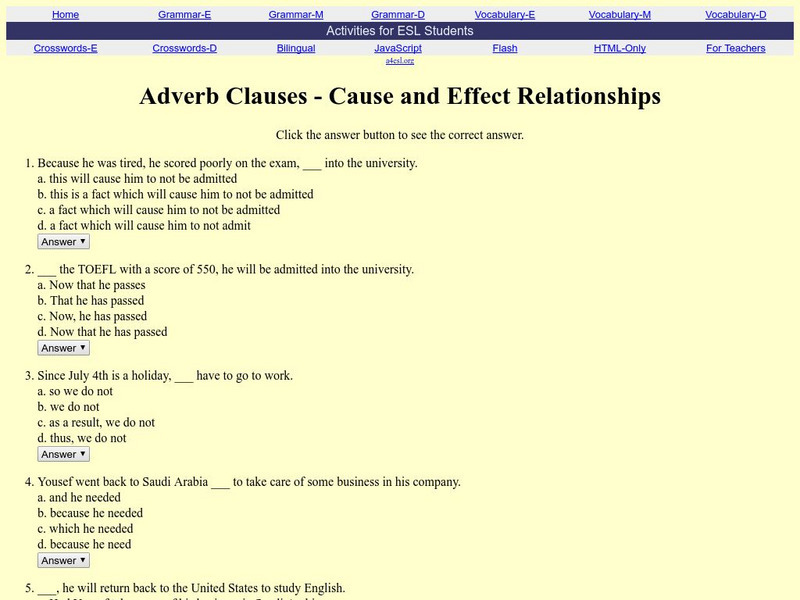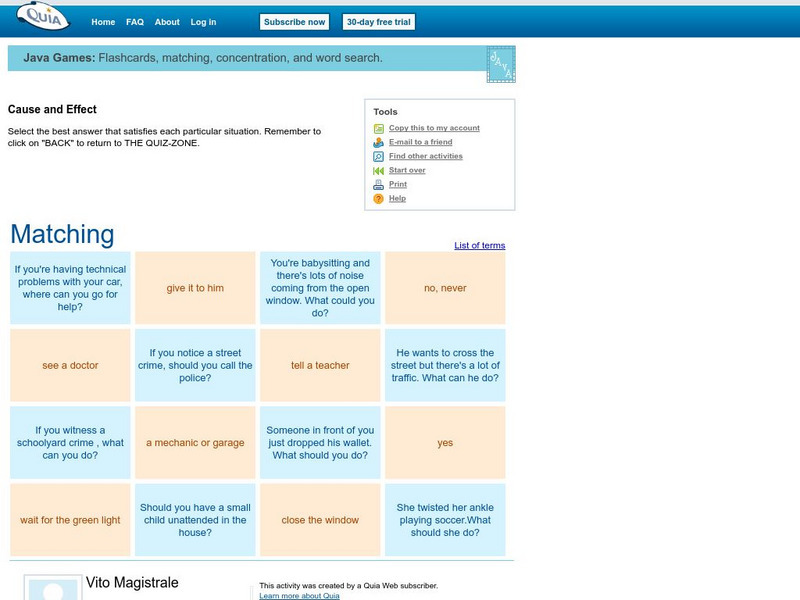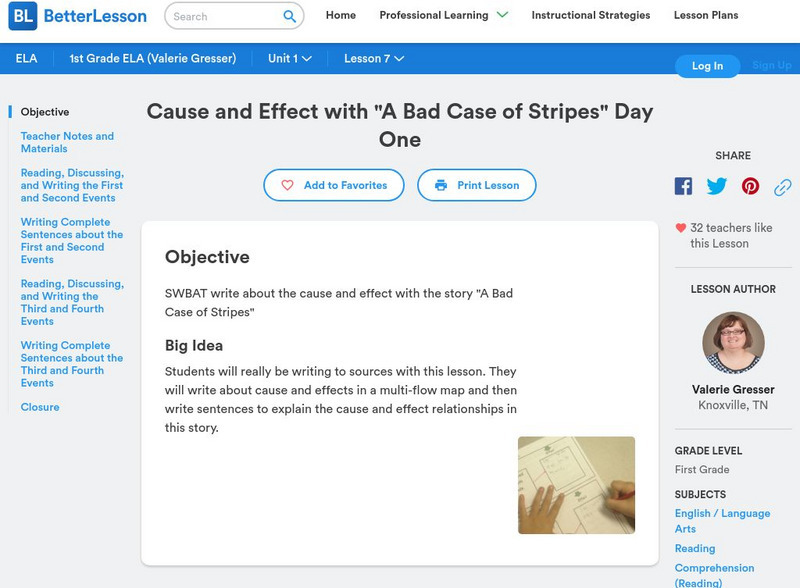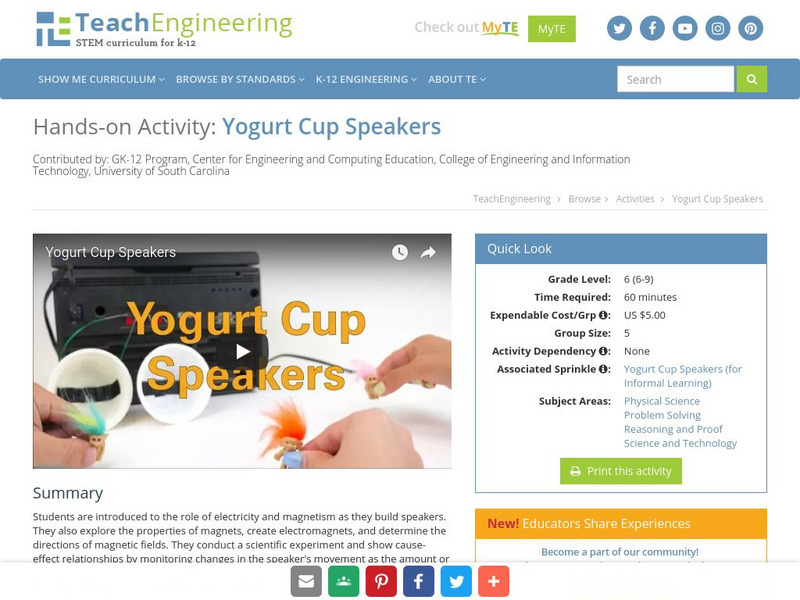Read Works
Read Works: Implicit Effects
[Free Registration/Login Required] Students will listen to this read aloud story and listen for cause and effect relationships in order to better understand the story.
University of South Florida
Fcat Express: Cause and Effect Thinking Map
A graphic organizer to help determine cause and effect relationships within a text.
TESL Journal
Activities for Esl Students: Adverb Clauses Cause and Effect Relationships
Twenty sentences where students fill in the blank with the correct adverb clause to show a cause and effect relationship. Each answer can be checked to see if it is correct.
Other
Sam Houston State University: Cause/effect: Pre Test
Read a series of short texts and answer multiple choice questions to demonstrate an understanding of cause and effect relationships within the texts.
Polk Brothers Foundation Center for Urban Education at DePaul University
De Paul University: Center for Urban Education: I Can Analyze and Infer Causes & Effects [Pdf]
This graphic organizer will help students analyze and infer cause-effect relationships. Students will use the graphic organizer to guide them as they determine several causes for one effect. Then students will write to explain the...
Quia
Quia: Cause and Effect
Identify cause and effect relationships by matching cards with a cause to cards with the effect. Correct answers are provided and a percentage score is available once the activity is complete.
Better Lesson
Better Lesson: Cause and Effect With "A Bad Case of Stripes" Day One
Young scholars will really be writing to sources with this lesson. They will write about cause and effects in a multi-flow map and then write sentences to explain the cause and effect relationships in this story.
Polk Brothers Foundation Center for Urban Education at DePaul University
De Paul University: Center for Urban Education: Analyze/infer Cause Effect Relations [Pdf]
Students will use guiding questions to help them infer cause-effect relationships in a story. Then students will use a graphic organizer as they analyze the cause(s) and effect(s).
ClassFlow
Class Flow: Cause Effect
[Free Registration/Login Required] This flipchart discusses cause and effect relationships and presents a variety of activities to help students understand this concept. Activote questions are included in the flipchart.
ReadWriteThink
Read Write Think: Sequence of Events Chart
A printable graphic organizer to help students sequence events and recognize cause and effect relationships within a story. Directions on how to use this graphic organizer as well as lists of teaching ideas and related resources are also...
Intel Corporation
Intel Education: Seeing Reason Tool
This interactive tool lets students build maps that explain relationships in several ways. Sample lessons using the tool are also available. Free registration is required for use of the Workspace.
Curated OER
Mc Graw Hill: Vocabulary Acquisition: Use Context Clues
This learning module focuses on using context clues to understand unknown words including definitions, examples, restatements, cause and effect/relationships, and comparisons. It provides examples with explanations and a practice...
The Wonder of Science
The Wonder of Science: 3 Ps2 3: Electric and Magnetic Forces
Learn about cause and effect relationships of electric or magnetic interactions between two objects not in contact with each other.
English for Everyone
English for Everyone: Sentence Completion 1: Level 5 [Pdf]
English for Everyone provides a printable quiz to assess the understanding of cause-effect relationships and drawing conclusions.
PBS
Pbs Learning Media: Disappearance of the Bees What's the Impact?
The disappearance of bees will have tremendous impact upon the way we live according to scientists in this segment from Nature.
PBS
Pbs Learning Media: Colony Collapse Disorder
In this video segment from Nature, scientists work to discover why bees are disappearing. [2:39]
Huntington Library
Huntington Library: Making Community Measurements: Abiotic Factors [Pdf]
A lesson plan in which students explore plant communities and observe different types of soil and weather conditions in an attempt to determine cause and effect relationships. Includes discussion questions, extension activities and web...
US National Archives
Docsteach: The Settlement of the American West
Students will analyze primary sources with an eye for cause-and-effect relationships.They will identify the roles of government policy and technological improvements in the settlement of the West, and explain their impact on Native...
Alabama Learning Exchange
Alex: Literary Elements in Jan Brett's the Mitten
Students will analyze such literary elements as plot, cause-effect relationships, sequence, and prediction in Jan Brett's The Mitten. Students will enjoy predicting upcoming story events and retelling the story from a dialogue that shows...
Indiana University
Indiana University East: Writing Center: Transitions: Understanding Signal Words
This resource page provides nine lists of signal words and what they mean. Covers words that show time, addition, contrast, comparison, illustration, location, cause and effect, conclusion or summary, and emphasis or clarification.
TeachEngineering
Teach Engineering: Our Bodies Have Computers and Sensors
Students learn about the human body's system components, specifically its sensory systems, nervous system and brain, while comparing them to robot system components, such as sensors and computers. The unit's life sciences-to-engineering...
ClassFlow
Class Flow: Christopher Columbus
[Free Registration/Login Required] This is an overview of the importance of Christopher Columbus integrating cause and effect relationships, discussion questions, and assessment.
TeachEngineering
Teach Engineering: Yogurt Cup Speakers
This lesson introduces students to the role of electricity and magnetism as they build a speaker. In addition, students explore properties of magnets, create an electromagnet, and determine the direction of a magnetic filed. They conduct...
TED Talks
Ted: Ted Ed: Feedback Loops: How Nature Gets Its Rhythms
Anje-Margriet Neutel describes some common positive and negative feedback loops, examining how an ecosystem's many loops come together to make its 'trademark sound.' [5:11]






![De Paul University: Center for Urban Education: I Can Analyze and Infer Causes & Effects [Pdf] Graphic De Paul University: Center for Urban Education: I Can Analyze and Infer Causes & Effects [Pdf] Graphic](https://d15y2dacu3jp90.cloudfront.net/images/attachment_defaults/resource/large/FPO-knovation.png)











